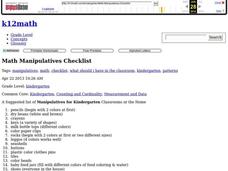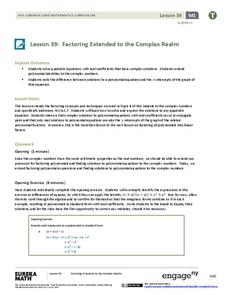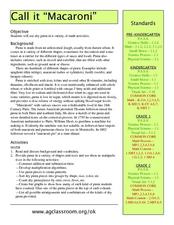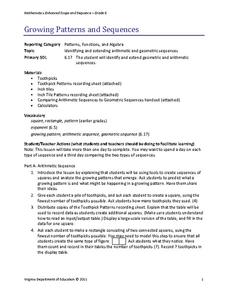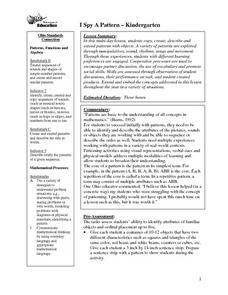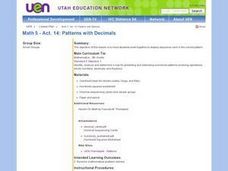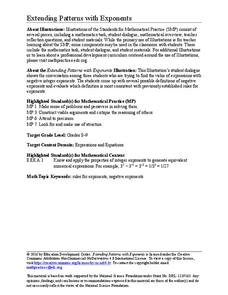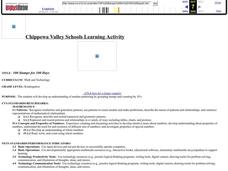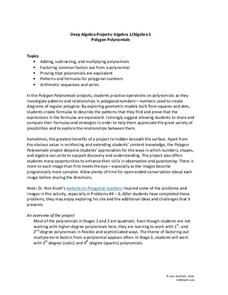PBS
Patterns to the Rescue!
Track down the Cyberchase episode that this instructional activity is associated with. Using a worksheet that is embedded in the plan, learners must find the next two numbers and shapes (a double pattern). Once these have been...
National Security Agency
Growing Patterns: Practical Pattern Problems
Your learners explore growing patterns by describing, extending, creating, and evaluating practical pattern problems in this three-day collaborative unit. Beginning with concrete patterns and function tables to extend and...
Curated OER
Patterns
Explore early algebra by participating in a pattern identification activity using a random assortment of different household materials. The class creates, completes, and analyzes different patterns with the help of leggos, buttons,...
EngageNY
Factoring Extended to the Complex Realm
A solution will work one way or another: find solutions, or use solutions to find the function. Learners use polynomial identities to factor polynomials with complex solutions. They then use solutions and the Zero Product Property to...
Curated OER
Patterns
Fifth graders recognize shape and number patterns. In groups, 5th graders use strategies to find patterns. They extend the patterns and give explanations as to how they found the pattern. Students use the computer and the hundreds...
Curated OER
Call it "Macaroni"
Who knew there were so many fun educational opportunities featuring pasta? Scholars read a brief informational text about the history of pasta (note that "macaroni" is spelled two different ways, so address this if kids are reading...
Virginia Department of Education
Growing Patterns and Sequences
Learners explore, discover, compare, and contrast arithmetic and geometric sequences in this collaborative, hands-on activity. They build and analyze growing patterns to distinguish which kind of sequence is represented by a set of data...
Curated OER
Patterns
Fourth graders investigate patterns and sequences. In this patterns and sequences lesson, 4th graders use a hundreds chart to build recurring patterns. Students skip count by threes and fives on a hundreds chart by coloring...
Curated OER
A Matter of Pattern
Students will create and predict patterns formed when making paper snowflakes. Students will construct snowflakes understanding that patterns may be predicted based on observation.
Curated OER
VARVES: Dating Sedimentary Strata: Geology, Paleontological Patterns
Young scholars count the number of varves (annual layers of sediment) in shale billets, taken from the Green River Formation in Wyoming. The count is then extended to reflect the entire 260 meters of sediments where the billets originated.
Curated OER
I Spy a Pattern-Kindergarten
Students copy, create, describe, and extend patterns with objects. They explore a variety of patterns through the use of manipulatives, sound, rhythms, songs and movement. Cooperative processes are used to encourage partner discussion.
Curated OER
Repeating Patterns
Students explore growth patterns by using manipulatives such as pattern blocks, investigate growth pattern of pattern, record growth in T-chart, describe how pattern is growing, and predict number of blocks needed to extend pattern.
Curated OER
Patterns with Decimals
Fifth graders are given a set of manipulatives to use to develop patterns. In groups, they follow the directions to determine which blocks go with which pattern and put them into the correct sequence. To end the lesson plan, they...
Curated OER
Investigation-How Many Toothpicks?
Seventh graders use toothpicks to investigate a series of designs and identify patterns. Data is organized and analyzed using tables and graphs, and students make generalizations using algebraic expressions.
EngageNY
Dividing by (x – a) and (x + a)
Patterns in math emerge from seemingly random places. Learners explore the patterns for factoring the sum and differences of perfect roots. Analyzing these patterns helps young mathematicians develop the polynomial identities.
Curated OER
"Spooktacular Patterns" - A Math Unit for October
Students extend a pattern using everyday objects. They use sound and objects to make a pattern
Education Development Center
Extending Patterns with Exponents
Don't think negatively about exponents. Young mathematicians dissect a fictional conversation between pupils trying to evaluate an expression with a negative exponent. This allows them to understand the meaning of negative exponents.
Curated OER
100 Stamps for 100 Days
Students recognize similarities and generalize patterns. In this math and technology lesson plan, students develop an understanding of number patterning by grouping stamps and counting by 10s.
Chicago Botanic Garden
Historical Climate Cycles
What better way to make predictions about future weather and climate patterns than with actual climate data from the past? Young climatologists analyze data from 400,000 to 10,000 years ago to determine if climate has changed over...
5280 Math
Polygon Polynomials
Patterns in polygons lead to patterns in polynomials. Presented with a series of polygons, individuals create polynomial expressions to represent their patterns. The algebra project consists of nine problems that incorporate polynomial...
West Contra Costa Unified School District
Writing Exponential Functions Based on Data
Give your class a concrete example of exponential growth and decay using this hands-on activity. These Algebra II lessons allow for the exploration of exponential growth and decay models, as well as the discovery of the patterns of...
5280 Math
Go with the Flow
Round and round they go ... where they stop, only scholars will know. By writing systems of equations, classes determine the number of cars a roundabout can handle given specific constraints. Systems use up to six variables and become...
02 x 02 Worksheets
Inverse Functions
Young mathematicians look for patterns in inverse functions as they relate to the original functions. The comprehensive lesson emphasizes vocabulary throughout as well as algebraic and graphical characteristics of the inverse functions.
Facing History and Ourselves
The Nazi Party Platform
Not all party platforms stay democratic. A resource covers many political issues in Germany during the time of World War II, and teaches pupils about the Nazi party platform and what went wrong. Individuals participate in a warm-up...


